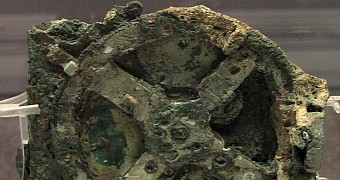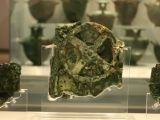Back in the 1900s, sponge divers exploring the waters off the coast of Greece came across the remains of a ship that sunk sometime in the 1st century BC. This ancient shipwreck produced one of the most astounding archaeological finds ever.
In a nutshell, researchers who later arrived in the area to have a better look at the ship's remains recovered a clock-like device now hailed as the world's oldest computer.
The device, photos of which are included in the gallery bellow, is undoubtedly thousands of years old. What's interesting is that, according to a new study, it appears that it's about a century older than scientists first assumed.
Just how old is this ancient computer?
Following its discovery in Greek waters, the clock-like device, known as the Antikythera mechanisms, was closely examined and researchers concluded that it had been put together sometime between 150 BC and 100 BC.
However, specialists Christian Carman and James Evans say that it was actually built about a century earlier, in 205 BC. These scientists base their claims on information obtained while studying the device's inner workings.
As mentioned, the mechanism served to keep tabs on the cycles of the solar system. More precisely, it used bronze dials, gears and cogs to track the movements of Mercury, Venus, Mars, Jupiter and Saturn, as well as the sun and the phases of the moon.
History enthusiasts Christian Carman and James Evans say that, rather than relying on trigonometry to predict eclipses, the ancient Greeks used Babylonian arithmetical methods.
This means that they were able to put together this ancient computer considerably earlier than assumed, simply by borrowing Babylonian arithmetical systems, the Greek Reporter explains.
“The eclipse prediction scheme was not based on Greek trigonometry (which was nonexistent in 205 B.C.) - but on Babylonian arithmetical methods, borrowed by the Greeks,” the researchers explain in a statement.
What's more, word has it that, in one of his stories, Cicero details the creation of such a mechanism. This mechanism was the brainchild of Archimedes and was brought to Rome by a general named Marcellus, following the mathematician's death.
Christian Carman and James Evans explain that, according to evidence at hand, the device was put together to track solar cycles starting the year 205 BC. Together with Cicero's story, this means that is was likely built in Archimedes' time.
As the researchers put it, “If the Antikythera mechanism did indeed use an eclipse predictor that worked best for a cycle starting in 205 BC, the likely origin of this machine is tantalizingly close to the lifetime of Archimedes.”
Not the only ancient computer discovered thus far
Earlier this year, in May, archaeologist announced the discovery of yet another impressive device best described as the forefather of modern table computers. This other machinery is believed to be of Byzantine invention.
The device, recovered from a site close to the city of Istanbul in Turkey, is said to be about 1,200 years old. By the looks of it, its owner used it both as a notebook and as a tool.
Thus, this ancient table computer comprised several overlaying rectangular panels covered with wax that likely served to take notes, and weights that researchers believe were used as an assay balance.

 14 DAY TRIAL //
14 DAY TRIAL // 



